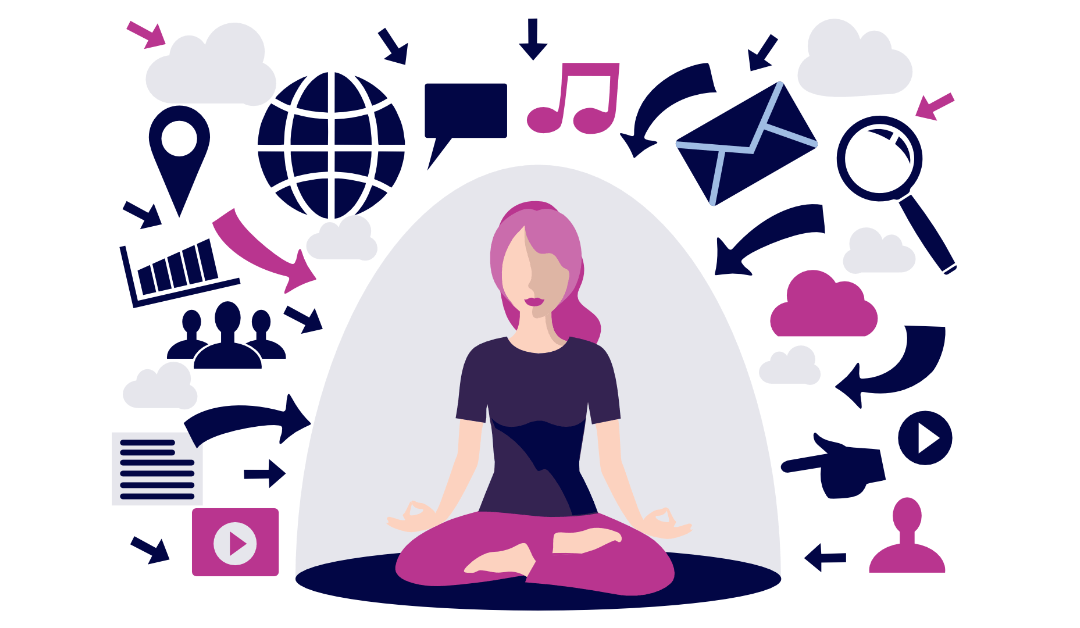Why are you angry? Why do you feel afraid? And what makes you sad? We are taught that the situations we are in, the events we experience and the people involved cause us to feel a certain way. This is not actually true. What really triggers our emotions are our thoughts.
Our thoughts are the result of how we learned and practiced thinking about everything, including people, situations and life in general. Whatever happens in our lives is not what causes our emotions. The people around us are not responsible for how we feel. We are. Your thoughts, emotions and actions are all about you.
Interpreting reality
In another post, I wrote about the actions we take and how we are trained into most of them. We learn how to react when we experience anger, fear or sadness. Maybe you shout or run away when you are angry. Maybe you shut down when you experience fear. This is learned behaviour. Over time, anything we repeat becomes automatic and actions turn into reactions.
While this concept is fairly easy to understand, accepting that your habitual thoughts are the same as your actions might be a bit more difficult. So let’s go through a few examples. Imagine the following event: Your boss sends you an e-mail and asks you to fix a mistake. How you feel about this e-mail depends entirely on the thought patterns it triggers.
Thought pattern 1: Damn. I made another mistake. Just like that one I made last month. Or is it even bigger? How could I not see this? How did I miss it? I was so careful. But then I always make mistakes. I should know better by now.
Thought pattern 2: Whoopsie, I missed that one. Good thing the boss caught it before I sent this off to the client! Not that the client would have minded. Or even noticed, lol. Let met just fix this… and done! Perfect. What’s next?
The first thought pattern triggers fear, anger and sadness, while the second leads to gratitude, pride, feeling connected and supported. The second pattern is much more appealing, isn’t it? So why would anyone even think the first thought pattern and how can we get to the second?
Established patterns
Begin by acknowledging that your habitual thoughts are just patterns. They are not the “truth” or even facts. You have simply thought them so often that the involved brain cells are highly connected. Electrical impulses run smoothly and automatically, making the thoughts feel familiar.
If your world so far has been dominated by fear, anger and sadness, that is ok because you did not know any better. If you have been running on auto-pilot, that’s fine too. You were raised to be “normal”, which just means to think, feel and act like most people around you do.
Another word for thought patterns is stories. We learn most of the stories we tell as children. Recent research suggests that our world-view is completed by the time we are seven (!) years old, meaning that the patterns for how we think, feel and react to certain topics are set at that age.
From then on-wards, we practise the same thoughts about life, other people, money and so on until they become automatic. Our thoughts trigger our emotions, which in turn influence our actions. The life we lead is a result of the stories we tell.

Waking up
You were trained into your world-view and raised to experience the same emotions which lead to the same actions and choices. So give yourself a break for everything that has happened in your life until now. It’s the past.
If you blame yourself, you are just embodying yet another negative pattern of guilt and shame. You are telling stories you learned to make yourself feel bad. Take a deep breath and let go because now that you know what is happening, you can decide to wake up.
Our brains change constantly. New neural pathways grow between brain cells while others wither away every single day. Old thought patterns are either strengthened or replaced by new ones. It’s entirely up to you.
Now that you know, you have a choice, you get to decide whether you want to remain in familiar patterns or replace them with new ones that match the person you want to be. You can choose to experience calm, joy, and excitement most of the time because it’s all about you.
The blame game
Before you can get there, let’s just remove one final obstacle. Who is responsible for the way we feel? Yesterday, your answer may have sounded something like “the people in my life”. This answer is part of another thought pattern you learned as a child. We are first initiated into the blame game as the culprits.
When parents, family members, teachers and anyone else, tell children that they need to behave in a certain way or the parent etc. will be “sad”, we are taught that we are responsible for how people feel. Have you ever been emotionally blackmailed into eating vegetables you didn’t like or clean your room on someone else’s schedule? That’s the blame game. It’s highly manipulative.
It’s also incredibly harmful. Not just because some of us are trained into becoming people pleasers, but also because most of us are taught to blame others for the way we feel. This has very serious consequences on the decisions we make. Why do we choose a life-partner or a job? Ist it because we like them or because we believe that they have the potential to make us feel good?
Advertisements are based on the same principle. You are supposed to by cars, make-up, clothes and anything else because the ads promise you a specific emotion. And what do we do when we feel bad? That’s definitely somebody else’s fault. If we are responsible for other people’s emotions, then they are to blame for how we feel. Right?
Mood comes first
This is a fallacy, which is another word for “lie” or “wrong idea”. The blame game comes hand in hand with another bad habit: justifying how we feel. Have you ever been asked the question “Why are you angry?” or “What are you afraid of?” At some point in your life you probably had an answer but as an adult, you are rarely aware of the true reason.
Emotions, like everything else, become habitual. They are chemical processes in our bodies. These processes flow more easily and smoothly the more often we practice a specific emotional response. Over time, we can accumulate so many chemicals associated with an emotion like anger, fear or sadness, that it becomes our default and is triggered ridiculously easily.
I bet you know at least one person who gets angry a lot, even about tiny issues. They might speak in an aggressive tone or shout at people. I bet you also know at least one person who reacts with fear to objectively harmless events. And what about the sad sack who always finds the tragedy in any situation?

Making up reasons
The real reason for how most of us feel is that we have so much stored and unprocessed anger, fear and sadness in our bodies that we just experience them in waves triggered by the automatic thought patterns running in our minds. None of this has anything to do with the situations we are in or the people around us. Because of the blame game, though, we find reasons to justify our emotions and actions afterwards.
“I lost my temper because he always blablabla”. “Forms are so long and complicated these days that they stress me out.” “What happened to her is so sad blablabla.” We only tell these stories because we are trained to. The real answers are very different.
Why do you feel anger? Because I never learned how to process my emotions so they built up in my body. Why do you experience so much fear? Because no one taught me that daily emotional hygiene matters as much as physical hygiene. Why do you cry about everything? Because I never take brain breaks so the waste products from thinking build up in my brain until they just have to burst out. (Crying means that your brain needs to pee. Stop holding it in.)
Since emotions are chemical chain reactions, they can also be triggered by chemicals we ingest. Why are you so angry all the time? Because I drink alcohol on a regular basis, which amplifies my anger to levels I cannot release safely. Why are you anxious? Because I eat sugar which triggers a chemical reaction that feels like fear. Why are you depressed? Because I do not eat enough fresh vegetables and fruit so my body does not have the right ingredients to produce happy hormones and neurotransmitters that would stabilise my mood.
Uncertainty and control
These are some of the real reasons why you experience the emotions you do. When you read them, how did you feel? Can you even imagine saying any one of the sentences in the previous paragraph out loud? If the answer is no, that’s normal. We are trained to give not just any reason for an emotion or an action. We are supposed to give socially acceptable reasons.
Shouting at a barista becomes “OK” if you can tell everyone that they made a mistake. By OK I mean, of course, that you can get away with it unpunished but is it really alright? No. When you shout at people you are simply the angry a-hole, no matter which excuses you make.
We are taught that these actions, especially angry outbursts and using guilt to manipulate others, are great ways to motivate people. Blaming, you see, is not just about justifying your emotions and actions. It is also about exerting control.
Our brains do not like uncertainty and the unfamiliar. Both are uncomfortable and even scary. That’s why we love falling into patterns so much and that’s what got you to this place because society also teaches us that control eliminates uncertainty. But the idea that we can and should control others is just another fallacy.
Step into your power
As long as you are a part of the blame game you have no power. You cannot control what other people do, how they think and how they feel. When you try, you are wasting a tremendous amount of time and energy. You are also setting yourself up for continuous failure.
The solution is to let go of the blame game. Take control of what is truly within your power: how you feel in any given moment and the person you embody. What other people do, think and feel is none of your business. When they shout in anger, this has nothing to do with you. You are neither responsible for how they feel and act, nor for handling them and their emotions.
What you are fully and solely responsible for, though, is yourself. What are the thoughts you keep thinking every day? Which patterns have you established so far and do you want to replace any of them? What are your dominant emotions and are you practising daily emotional hygiene? And finally, how do you act and show up in the world?
How you treat other people is never about them. What you say and do is never about others. Your thoughts, your emotions and your actions are all about you. They are a reflection of what is going on in your body and your mind. Your old thought patterns are not your fault. Luckily, we change all the time, which means that your new patterns are entirely up to you. Who do you want to be next? The choice is yours and only yours because it is all about you.
